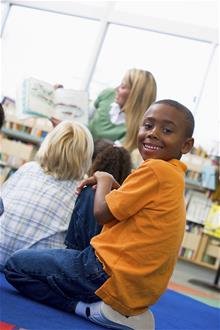 Today’s students must reconcile what they learn at home, what they are taught in school, and what they see on social media with their own questions, observations, and reactions. As educators, it is our responsibility to help them to make sense of the world.
Today’s students must reconcile what they learn at home, what they are taught in school, and what they see on social media with their own questions, observations, and reactions. As educators, it is our responsibility to help them to make sense of the world.
A growing body of research highlights the power of stories to help children manage their own and other people’s feelings. When we read, we insert ourselves into the story, walk in the characters’ shoes, and see through new eyes. The empathy we feel toward other characters wires our brains to have the same sensitivity toward real people—which helps us to build positive relationships based on trust.
These impacts extend far beyond the four walls of a classroom. The empathy gained from perspective-taking lends to more nuanced thinking, effective communication, and compassionate action in the real world.
Here are some resources for building empathy in the literacy classroom:
- ILA’s recent brief, Characteristics of Culturally Sustaining and Academically Rigorous Classrooms, describes how educators can provide students with a mirror “in which they can see themselves,” a window into “the vastness of the physical, social, cultural, and biological worlds,” and a doorway “to enter new realms of possibility.”
- Teaching Tolerance’s “Toolkit for ‘When Bad Things Happen’” provides professional-development resources to support students affected by community violence.
- A Literacy Daily blog post, “Starting Points for Fostering Empathy in Your Classroom—and Beyond,” outlines simple steps educators can take to expand the diversity in their classroom library.
- “Empathy: The Most Important Back-to-School Supply,” an article published by Edutopia, outlines a step-by-step “fitness plan” for building the empathy muscle.
- Previous #ILAchats, such as “Seeking Social Justice Through Literacy,” “Equity and the Inclusive Classroom,” and “Considering Concepts of Gender and Diversity,” focus on fostering empathy, tolerance, and inclusivity in the classroom. You can access these conversations on Storify.
- Common Sense Media published a list of Books that Teach Empathy for all ages.
- ILA’s live panel, “Disrupting a Destructive Cycle: How Literacy Drives Social Change,” moderated by Nikole Hannah-Jones, an investigative reporter covering racial injustice for The New York Times Magazine, and the corresponding Education Talk Radio segment with Monita K. Bell, senior editor at Teaching Tolerance, explore how educators can confront complex social issues in the classroom and harness the power of literacy for social change.
Alina O’Donnell is the communications strategist at ILA and the editor of Literacy Daily.